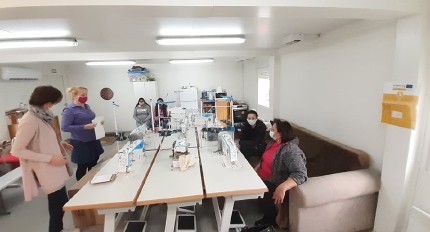The first employees of the Hungarian Social Impact Voucher (SIV) project
Within the framework of the Social Impact Voucher project, IFKA helped to organize 2 recruitment events for disadvantaged job-seekers in Nyírkáta and Tarpa, Eastern Hungary and supported the voucher-based recruitment and job placement of 21 jobseekers exposed to the threat of long-term unemployment.
The Hungarian Social Impact Voucher program developed and implemented by IFKA Public Benefit Non-profit Ltd. aims at helping disadvantaged job-seekers by providing voucher-based labour market services to local employers in order to connect them with potential employees. In the Hungarian voucher program, a total of 40 disadvantaged job-seekers are planned to be registered and placed at employers between the 1st of February and the 31st of December 2021. In the pilot phase of the program the TUTOR Foundation is responsible for providing voucher-based labour market services (recruitment and mediation of job-seekers) to local employers in the action area of the Catching-up Communities Program of the Ministry of Interior.
The TUTOR Foundation organized jointly with IFKA two recruitment events in Nyírkáta (25.2.2021) and Tarpa (13.4.2021) so far and registered 21 new job-seekers, of which 17 were placed and employed at the public work program of the Hungarian Charity Service of the Order of Malta in Nyírkáta and 4 at a sewing factory in Tarpa.
Concerning the beneficiaries, mostly people from the age group of 20 to 55 are involved in the program, who could be best described as having low educational attainment, poor financial conditions, and often health problems too (musculoskeletal, cardiovascular problems and upper respiratory diseases are the most common).
Regarding their general work experience, the majority have none or only limited experience, gained mostly in public work scheme programs. In addition, the lack of working and labour market skills and work motivation are also major issues in case of the target group.
In terms of their income situation, the majority live on money from employment substitution benefits and child benefits, and, if possible, supplement their income from undeclared work. Accordingly, the majority of the beneficiaries involved in the program live in poor housing conditions, their houses have a low level of comfort, some of them do not have electricity and almost half of them do not have gas either. It is not unusual that several generations (6 to 8 people) live together in the affected households.
Therefore, it becomes clear that the target group is in need of comprehensive support, which aims at empowering the beneficiaries and improving their overall quality of life. This is indeed the main goal of the Catching-up Communities Program and the Social Impact Voucher program.
According to the above results, IFKA already achieved 50% of the planned goals of the experimental phase of the Hungarian voucher program. The future of the pilot also seems to be secured.
Since the first recruiting events, 7 new job-seekers and a new employer (a duck processing factory in Tarpa) have additionally registered. New employers, which are most likely to employ the disadvantaged job-seekers constituting the target group of the program, are going to be established in 2021 in the settlements of Tarpa, Nyírpilis and Nyírmihálydi. Thus, the remaining 12 job seekers may be recruited in the second half of the year by the TUTOR foundation in cooperation with IFKA, within the frameworks of at least 2 more recruitment events.
IFKA therefore expects that the planned goals of the pilot program will be achieved by the end of the year and, based on the results and the lessons learnt, the scaling of the voucher program can be implemented with the involvement of public donors (e.g. Ministry of Interior, Ministry of Finance and Ministry of Innovation and Technology) as well as additional labour market service providers and professional organizations (e.g. Hungarian Charity Service of the Order of Malta).

